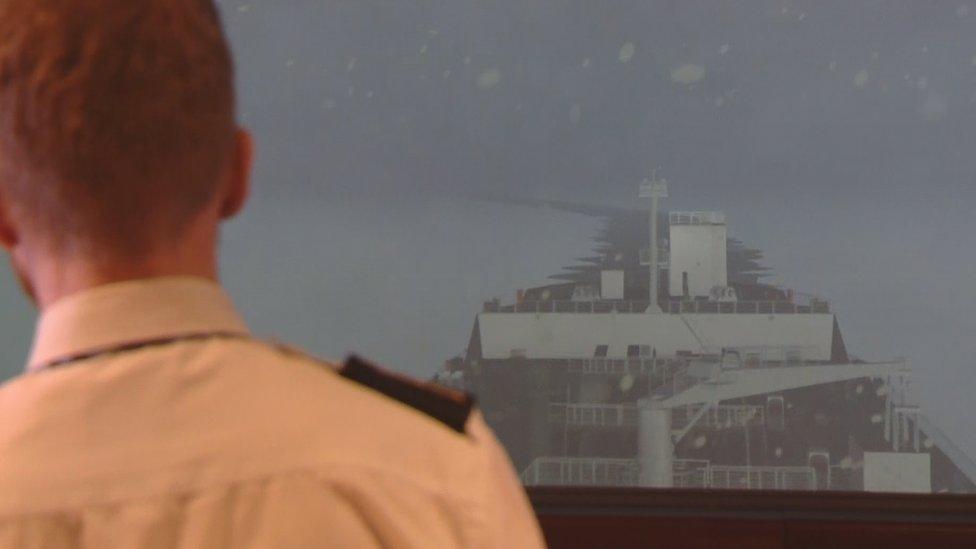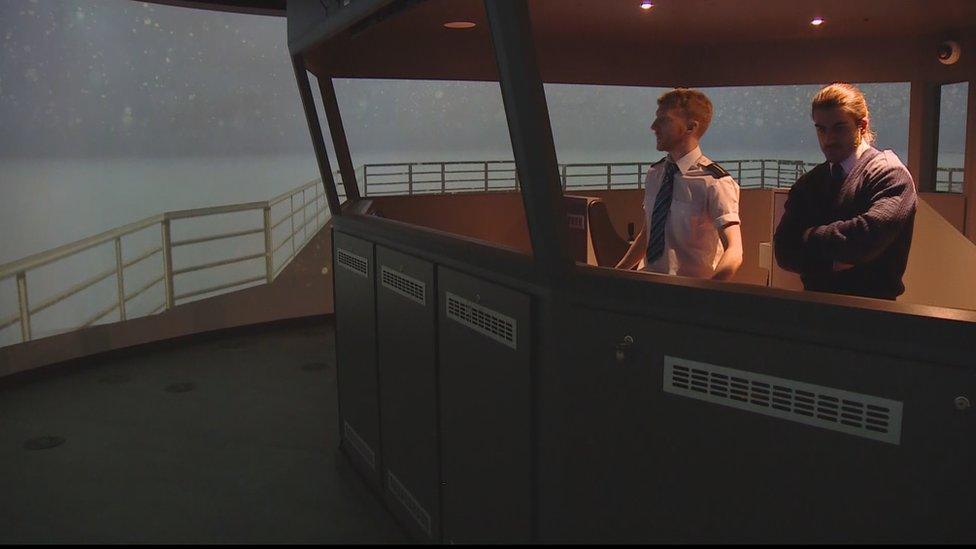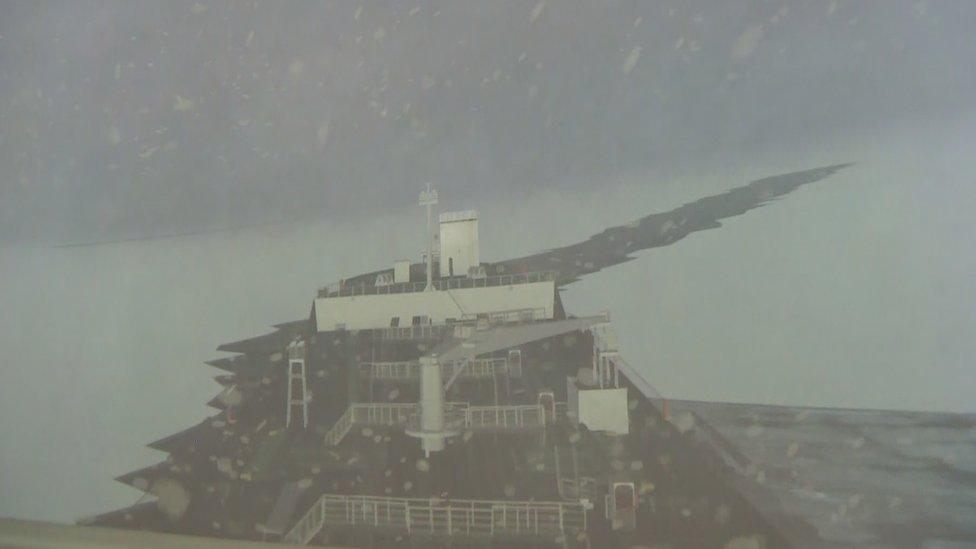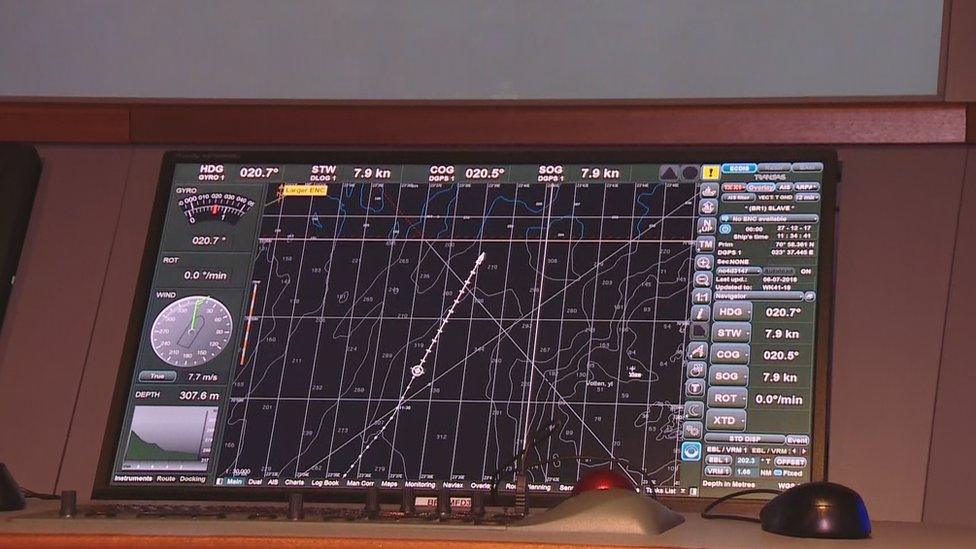Simulators at Glasgow college open Northwest Passage
- Published

The crew of the virtual cargo ship are able to plot their way through the ice
A new course is being launched to train merchant navy officers to navigate previously icebound polar waters.
The City of Glasgow College will use advanced simulators to offer some of the first courses of their kind in the UK.
The sea routes are opening up as climate change causes polar ice to melt.


The course allows the crew to monitor their movements and correct any mistakes
On the bridge of this massive cargo ship, it is comfortably warm. Outside, the weather is foul.
Snow flies, visibility is poor. We must use the radar to follow the channel cut through the sea ice by an icebreaker.
We are making seven knots somewhere north of Scandinavia. Virtually.
The bridge, accurate in all its instrumentation, is at the heart of a sophisticated simulator, one of five at the college. A 360 degree video screen provides the rotten weather.
Learning by doing
Next door in the control room sits Capt Philip Taylor, the curriculum manager for the new courses.
He is a looking at a wall laden with video displays.
"From here we can design or operate an exercise," he says.
"Through this screen I can see what the students are doing. There's also a microphone so I can hear what they're saying."

The view is just as it would be in real-life - only the cold is missing
Another screen gives an indication of how well the students are using the equipment on the bridge.
"Everything they do is recorded so we will play back after the exercise so we can see where they went well - or any mistakes they might have made."
This is learning by doing, on the principle that time spent on the simulated bridge will be more valuable than theory delivered in a lecture theatre.
One course offers basic training in polar navigation, the other advanced. Both are ready and awaiting approval from the UK government's Maritime and Coastguard Agency.
Once polar waters were the preserve of only the most intrepid adventurers. Now Capt Taylor says climate change is opening up the northern sea route over the top of Russia and the Northwest Passage above North America.
Fuel savings
"The possibilities now of using the northern routes through the Arctic saves the shipping companies a lot of fuel because they can save 5,000 miles from Shanghai across to Rotterdam," Capt Taylor says.
Some parts of the Arctic remain uncharted. That is one reason why the course involves Capt Craig Feeney, who spent years navigating the Canadian Arctic.
He unfolds a chart and shows me the route he took when he sailed the Northwest Passage.

The bridge area is accurate in all its instrumentation
"We went in this direction," he says, tracing an intricate line west to east through Canada's myriad northern islands, "through Victoria Strait here, past the site where Franklin lost his ships."
Sir John Franklin's expedition set sail in 1845 to find a route that would complete the Northwest Passage. Of the 129 men who set off, not one came back.
All that remained were a few graves, some camp sites, and human bones bearing cut marks that suggested a dwindling group of starving men had resorted to cannibalism.
The remains of Franklin's vessels Erebus and Terror were not discovered until 2014 and 2016 respectively.
The world has got warmer since then but Capt Taylor says the Arctic remains a hazardous environment, not least because if something goes wrong help can be a long time coming.
Rescue time
"You are your own safety net," he says. There is nobody else.
"The Canadian coastguard said if you have a problem...they can only guarantee to come and rescue you in 72 hours.
"That's a considerable length of time. Most other vessels in other parts of the world, they'd expect to be rescued in a few hours.
"There isn't the infrastructure in the Arctic and consequently you have to be that much more prepared."
The Glasgow courses will also cover the Antarctic. There, the growing emphasis is on tourism rather than trade routes.
There is a growing environmental debate over the levels of greenhouse gases produced by merchant ships, even if the new routes mean their journeys are far shorter.
But, for better or for worse, the Northern Sea Route and the Northwest Passage are open for business.